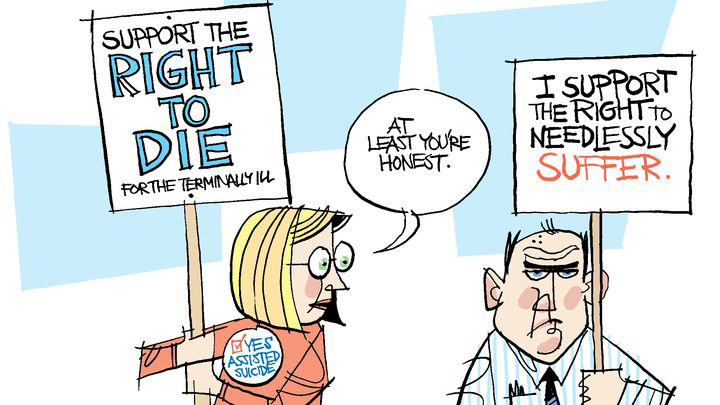Death with dignity
June 15, 2020
A quick death. A way out. An end to suffering, but only for the terminally ill. Death with dignity is an opinion that is often debated. In many of the states, it is against the law, seen as a crime, but this needs to be changed.
In October of 1997, Oregon became the first state to legalize euthanasia through the Death with Dignity Act, allowing patients who will die in the next six months to self-administer lethal drugs, prescribed to them by physicians for that use. Since then, California, Washington, Colorado, New Jersey, Vermont, Hawaii, and Washington D.C. have legalized euthanasia. In this nation today, human rights are strongly advocated every single day. In the category of human rights falls euthanasia, and those with an untreatable illness should have the freedom to make that choice for themselves.
The moral terms of euthanasia are what truly draws the line dividing the two sides. Those against legalizing euthanasia claim to be “pro-life.” However, what rightly matters is a life worth living.
Patients diagnosed with a sickness that has prevented them from engaging in any genuine activity for months, and possibly years, are not satisfied. When the painkillers stop working and the doctors say there is nothing else they can do, you wait for the taunting inevitable. And for some, that’s not the way they want to go. They would rather make a conscious decision than be cursed with a clock counting down, but never knowing when time is up. To just have the option is the freedom they deserve. Legalizing euthanasia may be fought against, but who gives anyone but the patient the right to make that judgment? And having that personal judgment is certainly something they deserve.
Brittany Maynard, a 29-year-old woman with stage 4 brain cancer decided to legally end her life in 2014. She became the face of the death with dignity debate and was a strong advocate for the right to die until her last days. Maynard, and many others throughout the country, knew how they were going to pass: through pain, struggle, anguish. But there was another way. A way to die on one’s own terms and surrounded by love and support. Maynard says “I believe this choice is ethical, and what makes it ethical is it is a choice.”
The sad truth about states who have not legalized euthanasia and physician-assisted suicide is that the terminally ill often choose to end their lives in other ways. Craig Schonegevel was a South African who dealt with neurofibromatosis, a type of brain tumor, for 28 years until he decided the pain was too much. However, denied by his legal system, physician assistance wasn’t available for him, and so he ended it in a much more severe way. Instead of dying surrounded by the love of his parents, they had to find him the next morning, lifeless. In addition, because it is not widely recognized as a right, patients without the money or resources often choose the harsher way out, just as Schonegevel did.
In this case, the loss of autonomy felt throughout each patient with a terminal sickness is extremely demeaning. The self-dignity that comes from dying on your own terms is what the pro-euthanasia activists are fighting for. While it is true that from a legal stance, a doctor should only practice in the role of a “healer,” in the case of a patient with an illness that will surely end their lives sooner than later, and healing is no longer a possibility, it should be a joint decision between doctor and patient.
Euthanasia is more than a way to escape the strain of a terminal sickness. It is a conscious choice that only you can decide. When it comes down to the truth, what really matters is what you know will end in an outcome that is best for you. If choosing to die with honor, and to painlessly break free from an illness that would continue to weigh down your life until it’s over is the path you choose, there is nothing that should stop that. Not your friends, your doctors, your family. Not ethics, not morals, not law. It should only be you.




